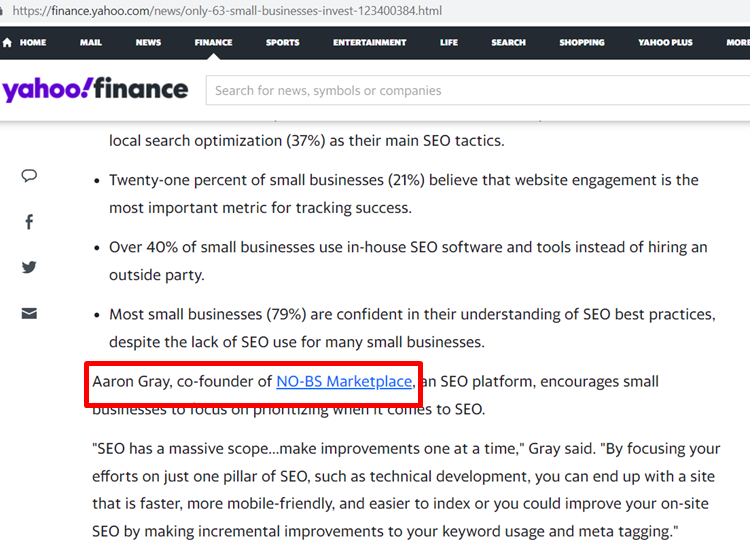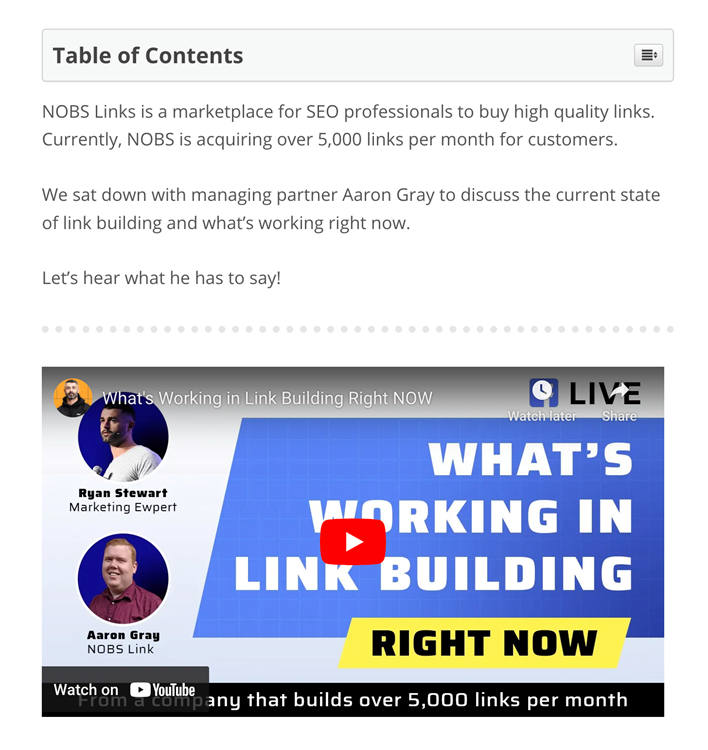What Are DA Links (& Why Do They Matter for SEO?)
-
Aaron Gray
- Blogs
-
March 06 , 2023
-
15 min read
Earning editorial links from authority sites is one of the fundamental aims of search engine optimisation (SEO). Websites with high domain authority (DA) scores have impressive viewership, and getting a link from them exposes your brand to a wider audience.
However, as with other SEO strategies, obtaining editorial links requires serious effort and time. Getting citations from trusted organisations demands that you work for them by creating brilliant content, being credible, and establishing authority. Without these essential elements, your link-building efforts won’t prosper.
Knowing what editorial links are and how to get them is crucial, considering their contributions to a successful SEO strategy. Similarly, it helps to understand the benefits they provide to your site. This article discusses all these things and more.
Understanding SEO links
Hyperlinks, more popularly known as links, are clickable words, phrases, images, or videos that connect a reader to another webpage. These links are further classified as internal, external, and backlinks. Internal links forward a reader to another page within the website, while external links are embedded in your webpage and lead readers to another website, hence the name. Meanwhile, backlinks connect from an external website back to yours.
Strategic link-building is a prominent SEO tactic because a robust link profile is a trust signal for search engines. Machines assume that your content is credible and valuable if they notice multiple high-quality sites linking to your pages, positively impacting your SEO efforts.
What are editorial links?
There are several ways to acquire links, but nothing is more valuable than earning editorial links.
Editorial links are backlinks found on other websites, particularly authoritative sites, that have chosen to link to your content. Unlike acquired links, editorial links are earned naturally. They’re not paid, requested, or gained in exchange for something.
In other words, an editorial link happens if you spend enough time and effort crafting great content and constantly improving your online marketing strategies. It occurs when other authoritative sites find your digital assets reliable and trustworthy. SEO experts consider this the ‘holy grail’ of link-building because it pulls your ranking, exposes your brand to a wider audience, and strengthens your overall linking profile.
Editorial link examples
Content writers, journalists, or bloggers often cite credible sources, like studies, research findings, and statistics, to create content. An editorial link is produced when other writers cite your content as a source and insert the link to your page within the article.
Editorial links are commonly generated through the following instances:
- A high authority (HA) website refers to your content to complement a claim or assertion.
- An external site directs its readers to your webpage for additional information.
- An external site quotes an expert source from your organisation.
- An external site mentions your brand and supplies a backlink.
- An external site features your brand, products, or services in an article, for instance, an expert roundup.
Your site’s link profile and ranking are boosted when this happens. So, your search engine status becomes stronger as more reliable sites link to your page.
What does high DA mean?
Domain authority (DA) is a predictive and comparative SEO metric developed by the SEO software company, Moz, to predict search engine ranking. Like search engines, the domain authority calculator is run by machine learning and uses multiple considerations in computing a DA score. Higher scores mean better chances of ranking, although the company stresses that DA scores aren’t included in the search engine’s ranking factors.
Moz also clarifies that lower DA scores don’t mean the site is bad; it just means that the owner needs to strengthen their SEO and link-building efforts – particularly the quality and quantity of external links – for better scores.
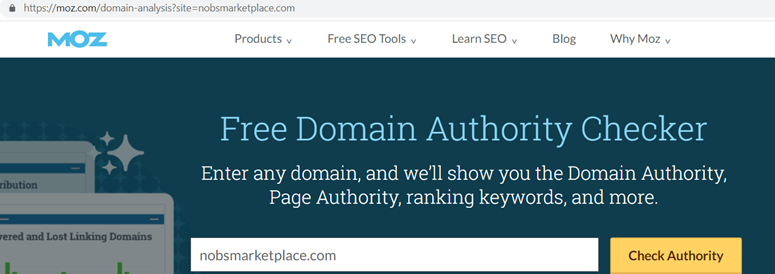
As a reference, the world’s most popular sites often have high DA scores of 95 to 100, whereas new sites have the lowest scores at 10 or so. Site DA scores of over 50 are considered good.
How Can You Get High DA Editorial Links?
As mentioned, high DA editorial links are used to back a claim or add credible information. But it can be challenging for less popular businesses with lower search rankings to get cited, especially by high-authority sites. However, there are proactive measures you can adopt to get natural editorial links. Try these activities and determine which ones provide the best results for you.
1. Publishing high-quality content
The digital realm is saturated with these numerous resources uploaded worldwide every second,
making it almost impossible to get noticed. According to the latest figures, more than 7 million blog posts are published daily.
Content is one of the most prominent SEO ranking tools. It’s also one of the most versatile. Apart from blog articles, other types of content include infographics, case studies, white papers, instructional videos, e-books, and so on.
Knowing what to write about could be the biggest challenge, but with content planning and SEO
tools, you’d know which topics your audience wants to learn more about. Similarly, you can
scan popular Q&A sites for additional inputs.
Creating informative, relevant, evergreen content to match a captivating headline is necessary to
hook readers’ attention and keep them glued to your page. Besides being relevant, your digital
asset must be highly shareable.
Creators are integrating other media types, like images and videos, to make their written
resources more interesting and stand out. Others are repurposing their content for maximum
exposure, for instance, by turning audio podcasts into blog or news articles, listicles, or
infographics. More exposure increases the probability of being noticed by higher DA sites,
especially alongside content optimisation best practices.
Keeping it updated
Keeping your resources up to date is just as important as creating them if you want to get high
DA links. Ideally, your content should be evergreen or timeless, but it isn’t always
possible, considering frequent industry changes and emerging trends. Update your content
as necessary to maintain its relevance and usefulness.
2. Conducting ground-breaking industry research and publish your findings
Uploading research findings on a relevant topic is another way to get editorial links. Writers always look for new sources to back their claims or boost their assertions. They’re more likely to link to your site if you’ve written factual content related to their article, even if it’s not the exact subject.
For example, a bed manufacturer has commissioned a recent nationwide scientific study on consumers’ sleep patterns, discussing how much sleep they get on average, the common sleep disruptors, and which factors help them sleep better. However, the team discovered that many young children suffer from sleep deprivation.
Because of public interest, a writer from a high DA site may decide to write on these findings, or you can pitch them to authoritative sites, for instance, a reputable news organisation, to make a story out of it.
Positioning your site as a credible source takes time. Invest time and effort continuously in producing content with added value to get editorial links.
3. Polishing your content marketing strategy
Letting brilliant content stay on your site isn’t a wise move in most cases, especially if you’re not offering paid subscription services. Your content must be highly visible on the search engine ranking pages (SERPs), considering that most users don’t go beyond the first page, and 27.6% of them click the top organic search result. Landing on the first page is a tough journey, but you must try to improve your ranking.
Promoting your digital assets boosts online visibility, which is where content marketing comes in. Don’t wait for your content to get noticed. Do these instead:
- Re-post your content on popular online platforms.
- Post a teaser or snippet of the content on your social media accounts.
- Reach out to authoritative websites and see if you can post content as a guest (a.k.a guest blogging).
- Provide industry-related answers in Q&A sites or communities.
These are only a few strategies to distribute your content and get what you want: high-DA or editorial guest post links. No matter your route, it pays to establish relationships with different industry actors to further your link-building interests.
4. Tapping mainstream news media channels
News agencies have a wide readership, making them a great platform for acquiring editorial links. Reach out to local media organisations and ask for topics for consideration before moving on to other publications with bigger scope.
As an aside, The New York Times is the world’s most popular news agency, with 8.4 million digital subscribers as of March 2022, according to Statista. It’s trailed by The Wall Street Journal, with 3 million subscribers and The Washington Post, with 2.7 million paying readers.
- Link with news agencies
As mentioned, factual and useful content presents good brand link-building opportunities. Have your marketers connect with the publication’s editorial team for a possible collaboration.
Be reminded that most publications and high-DA sites maintain strict editorial policies, and only a few are receptive to guest posting. They also steer clear of promoting brands except for advertorial posts, so an editorial link is your best bet in getting featured.
- Sign up for HARO
Similarly, connect with journalists through online platforms, for instance, Help A Reporter Out (HARO). This channel connects journalists and writers to industry experts who can act as reliable sources for their stories. Expert sources are updated regularly about reporters’ queries and their requirements. You can gain media mileage and earn high DA editorial links if a media outlet chooses you as a source.
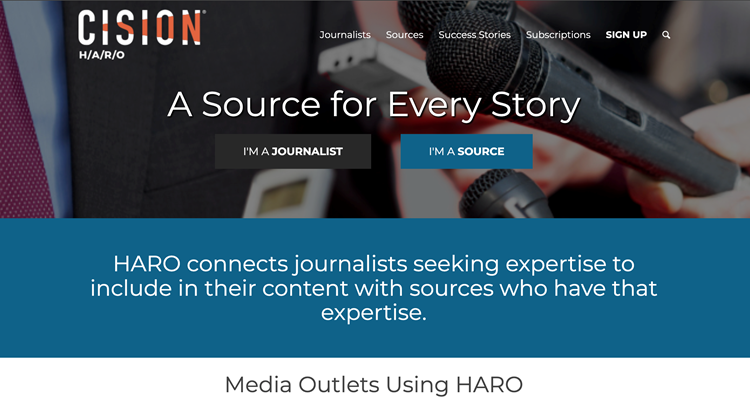
- Earn press links
Press links are hyperlinks from media outlets and websites that connect to your page or site. You can earn them by being featured in the publication or by writing a press release and pitching it to the outlets.
Product releases and updates are a good way to earn editorial links. So is doing or discussing something about an important industry topic. To be featured, however, means you qualify as an industry expert or doing something out of the ordinary.
You can also resort to the traditional practice of pitching news stories and press releases, which works better if you have an established relationship with the editors or writers. Other companies hire a public relations consultant or company to take charge of building their brand.
5. Analysing your competitor’s editorial links and strategies
The good thing about SEO software is that it can help you with benchmarking. You can use specific tools to check and analyse your competitors’ editorial links.
For example, Semrush has its Backlinks Gap tool that shows the sites with the best backlinks profile and the most popular link sources. Studying it allows you to identify outreach and linking targets, enhancing your link building profile.
Another SEO software tool by Ahrefs lets you add a competitor’s website to show a ‘Best by links’ report. This tool lets you see your competitor’s link building strategies by offering its best pages by backlinks, allowing you to understand their strategy.
Aside from identifying outreach opportunities, the tools above can provide insights into the most consumed content types and topics relevant to your niche. That said, using these tools can contribute to enhancing your content strategy. Instead of churning out the same topics as your competitors, identify the gaps and write quality content.
6. Collaborating with third parties
If you’re an industry expert or a company executive, don’t shy away from collaborations and interviews, as these could present great opportunities for gaining SEO editorial links. In addition to working with mainstream media companies, finding allies among other content creators and companies can help improve your link-building efforts.
- Interviews: Getting interviewed and seeking interviews are useful in getting editorial links because parties involved want to share the content either way. Being cited as a source puts your company in the spotlight and boosts your authority, allowing readers to trust your brand more.
Conversely, focusing on an industry expert could get you an editorial guest post link that can be shared by the companies they represent.
- Roundup link building: Most sites feature a curated list of the best content discussing specific topics regularly. You can reach out to these industry-relevant sites and get featured if you pass their editorial requirements, which earns you an editorial link.
Your business can’t exist without collaborating with other entities, especially if you’re running a business-to-business (B2B) firm. Getting editorial links can help you in such cases because it requires you to reach out and develop professional relations with executives from high-DA sites.
7. Turning unlinked brand mentions into backlinks
Unlinked mentions happen when a site refers to your brand or site but doesn’t attach a backlink. Scan old, suspended or expired domains and request the webmaster to include a link to your site.
Finding opportunities to earn additional editorial links is easy by using SEO software tools. You can also turn the notification setting on for unlinked brand mentions in your search engine.
Monitor unlinked citations and list the page uniform resource locator (URL) to decide high authority domains for prioritisation. Ensure that you’re reaching out to the right person in the company before sending your backlinking request.
The Benefits of Earning High DA Editorial Links
High-quality editorial links provide multiple benefits to your business. It boosts online visibility and improves brand reputation and authority with minimal cost. Need more convincing? Below are some compelling reasons to obtain high DA editorial links.
1. High DA editorial links can bolster site visibility
An optimised website remains one of the most prominent communication channels for marketers. However, getting noticed and gaining visibility is hard, especially if competing with around 2 billion websites. Gaining editorial links from authoritative sites increases your chances of getting found. With better visibility online, you can communicate with your audience better.
2. High DA editorial links give your organic web traffic a boost
Authority sites naturally have a wide readership, whether industry-specific or otherwise. You instantly gain more exposure when your brand earns a backlink from high DA sites. Readers who view reputable sites as trustworthy are more willing to explore your content if any links are featured on a high authority site.
3. High DA editorial links help improve your search ranking
The most significant benefit of earning backlinks with high domain authority is its positive impact on your search ranking. As every SEO practitioner would know, search engines put a premium on user experience when evaluating a page. Getting several links from authoritative sites indicates that your content is valuable and relevant to readers, boosting your spot.
4. High DA editorial links strengthen your domain reputation
Domain reputation is essential in SEO because it represents your site’s soundness and trustworthiness. As with other SEO elements, your reputation is impacted by several factors, including bounce rates, user engagement, spam complaints, inbound link quantity and quality, content quality and relevance, etc. Possessing good domain health is one of the primary search ranking factors.
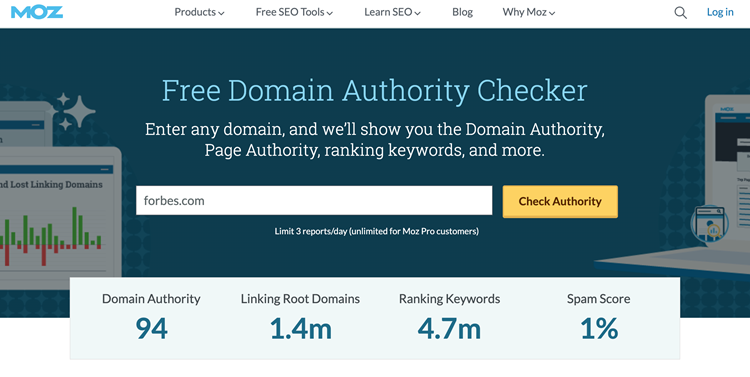
5. High DA editorial links ensure compliance with search engine rules
Black hat SEO practices are unethical strategies that harm your website and ranking, as search engines penalise sites that adopt them. These include buying links, launching comment spam, trading links, spinning content, anchor text stuffing, embedding malicious links, and so on.
High authority sites avoid such harmful practices at all costs and want their sources to do the same. You can minimise the risk of being tagged as a potentially dangerous site by implementing sound link building efforts, including seeking editorial links.
6. High DA editorial links help establish site authority
Obtaining editorial links from high-authority sites can help elevate site authority in consumers’ and search engines’ eyes. Humans often learn through association, which may be intentional or unintentional. If they come across your brand on a site they trust, this positive impression will also be passed on to your business. Search engines assume the same position when scanning sites with your backlinks.
Conclusion
Boosting marketing and SEO efforts offer smart solutions to increase brand awareness. Building high DA editorial links, for instance, can take site visibility and authority to the next level if done strategically.
Even so, obtaining high DA editorial links isn’t a walk in the park. With thousands upon thousands of sites in any industry, it’s almost impossible to get noticed. The tips discussed above provide valuable insights into every brand’s link-building efforts.
One of the most important things to remember is that a high authority site will only link to your page if you have a rich supply of valuable and well-created content that’s both unique and in high demand. After all, there’s no shortcut to building value, reputation, credibility, and authority in the eyes of humans and search engines.
Subscribe to Our Blog
Stay up to date with the latest marketing, sales, service tips and news.




